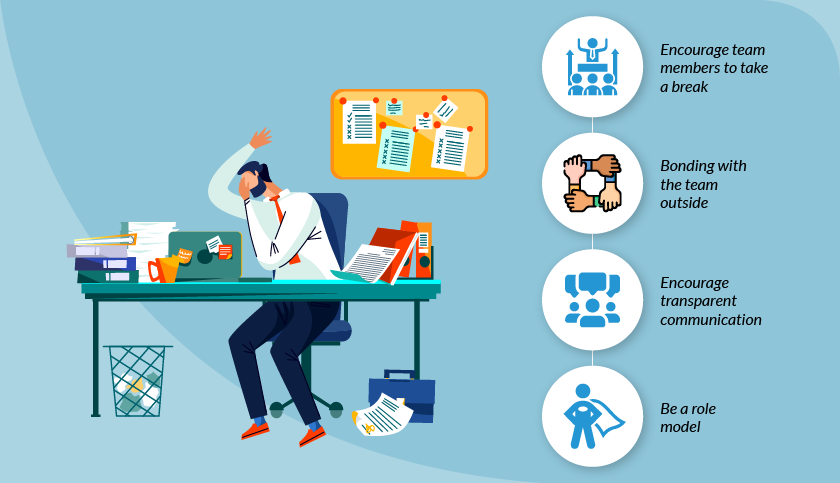Why is it important to manage your employee’s stress ever than before? – Part II

- Clarity of Roles
- Flexible Environment
- Recognise the contribution of team Members
- Encourage team members to take a break
- Bonding with the team outside
- Encourage transparent communication
- Be a role model
• Encourage Team Members to take a break: Many companies feel that working continuously and offering lesser breaks increases work productivity. Taking a break from work seems more like a taboo!
The pandemic crisis has made the world go into a lockdown mode, and Work-from-Home has become the new normal for many organisations. We are social animals, and this can create loneliness and isolation. With home and work overlapping over boundaryless space and the effect of being lockdown and movement restriction, it is extra pressure and stress that can affect physical and mental wellbeing. However, there are a ton of researches to prove taking a break leads to increase in productivity.
Better break time allows the team member or team to stay efficient and energetic, especially when work gets challenging and help keep your sanity at work. Mini breaks like five to ten minutes that may include stretching or a walk to get some fresh air, meditation, listening to music can help the team recharge and refocus and work more effectively.
• Bonding with the team outside of work: When you bond well with people you work with, you are far more likely to collaborate and co-create work leading to higher productivity.
A good leader encourages and ensures some bonding activities outside the office that allows team members to put work behind and get to know them better in an informal atmosphere and help boost creativity.
A few of them can be
- Getting the team together for outdoors like a trek or a camp. This can be a great way to break the routine and get some fresh air
- Hosting a fun day that includes games and challenges like hiring a cricket or football turf
- Taking the team out for lunch or dinner
- Involving the team in some form of art and crafts
- Having fun time with board games
- Doing some role switch within departments to give a perspective of other’s the work and help you appreciate work of that department
- Bonding over online games, watch parties and virtual movienights are some of the examples that add a fun element and keep the employees engaged outside of work even during this lockdown period
• Encourage transparent communication: A mere lack of communication can create substantial stress levels, and it mostly stems from a working relationship more than the work itself. This may also create anxiety, sleep disorders and other health issues.
Creating an open-door policy makes employees feel empowered as their work issues are heard primarily in the case of senior leaders. The younger generation gets to know the senior-most leader and doesn’t feel shy to express their opinions, the bottlenecks they are facing.
The leaders tend to listen to the employees whom they have known well or have been in the organisation for a reasonably long period. The open-door policy helps reduce this bias and listen to employees without any prejudice, thus increasing engagement and productivity of the organisation.
And this is something that we have clearly experienced with our initiatives like
- Chitchat sessions with the Founder – welcoming the new
- Birthday Meet with the Founder ( All Life Engineers having birthdays in that particular month),
In these sessions the employees get to have an informal chat, express opinions and share ideas which help our team to connect with Founder and vice-versa, thus boosting employee morale and letting them know he’s a part of the team.
Also, with COVID-19 crisis, leaders must proactively share information and impact on the company to avoid ambiguity and nurture confidence amongst employees.
• Be a role model: When you are in a leadership position, then you need to know to lead by example. And you will see the team follow suit
It can be planning an annual vacation (read our blog post on Stretch Leave) or prioritising health.
Many well-known Indian corporate honchos have taken up marathons that help to create a wellness culture for their respective organisation. Or create an open communication channel and create a boundary-less organisation like Jack Welch of GE to ensure the inflow of ideas and open communication that helped create an incredibly successful company.
When it comes to reducing stress at the workplace, there isn’t a one-size-fits-all option. Other than the pointers mentioned above, you can come up with unique stress reduction ideas depending on the age group and geographies. Some creative ways may include creating something out of a Lego challenge, fitness workouts or challenges and more, going out for nature trails, days off to volunteer etc.
Increasingly organisations are correlating stress and workplace culture and therefore relying on traditional as well as unique measures to stamp it out. Team members are the heart of the business, and competent leader or managers realise that they play a pivotal role in creating and nurturing culture. And implementing them will only increase efficiency and happiness quotient in employees.
Categories
Recent Posts
Subscribe
Never miss a post from Fabtech. Sign up to receive updates direct to your inbox.
